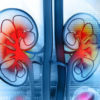Colon Cancer Treatment in Northern New Jersey
Colorectal cancer is one of the most common forms of cancer in the United States. Fortunately, it is treatable, especially when detected early through a routine colonoscopy. At Bergen Medical Associates, a Patient-Centered Medical Home (PCMH) in New Jersey, patients can receive comprehensive primary care and a wide range of specialty services, including gastroenterology care and colon cancer screening.
What Is Colon Cancer?
The colon and rectum are parts of the body’s digestive system. The colon absorbs water and nutrients and passes waste to the rectum. Any cancer that develops in the rectum or large intestine can be classified as colorectal cancer. Colon cancer most often develops because of the presence of precancerous polyps. Over time, these polyps can grow and mutate into cancerous cells.
What Are the Symptoms of Colon Cancer?
Signs of colon cancer may include:
- Chronic abdominal pain, bloating, or cramps
- Chronic diarrhea, constipation, or other changes in bowel habits
- Rectal bleeding or blood in the stool
- Weakness or fatigue
- Nausea or vomiting
- Anemia
- Unexplained weight loss
In the early stages of colon cancer, a patient may not experience any symptoms. That’s why routine screenings are so important.
What Are the Risk Factors for Colon Cancer?
While anyone can develop colorectal cancer, certain factors may put a patient at higher risk. These include:
- Age: Most patients with colon cancer are over the age of 50.
- Racial and ethnic background: African-American and Ashkenazi Jewish patients are at higher risk of colon cancer than people of other races and ethnicities.
- Medical history: Patients who have had noncancerous colon polyps have a greater risk of developing colon cancer in the future. Certain inherited conditions, such as familial adenomatous polyposis (FAP) and Lynch syndrome, can also increase risk.
- Family history: A person is more likely to develop colorectal cancer if they have a blood relative who has had the disease.
- Diet and lifestyle: Smoking, heavy alcohol use, a sedentary lifestyle, and a low-fiber, high-fat diet are all associated with a higher risk of colorectal cancer.
When Should I Get Screened For Colon Cancer?
The American Cancer Society recommends regular colon cancer screenings beginning at age 45, although patients with higher risk may need to begin screening earlier. There are several FDA-approved tests, including stool tests, computed tomography (CT) scans, and flexible sigmoidoscopy.
The most common screening is a colonoscopy. In this test, a gastroenterologist uses a thin, flexible tube to examine the inside of the rectum and colon, remove polyps before they grow or become cancerous, and biopsy tissue for lab testing.
Before undergoing a colonoscopy, a patient will prepare by drinking a fluid that helps clean out the colon. They will need to fast before the procedure and stop taking certain medications. Because the patient is under anesthesia during the procedure, they will need someone to drive them home afterward.
A colonoscopy may be performed at a hospital or surgery center. On the day of the procedure, the patient will receive an IV to administer anesthesia and pain medication. While the patient is under anesthesia, a doctor will use a colonoscope to examine the lining of the bowels. If the doctor finds any polyps, they can be removed right away. If no polyps are found, a colonoscopy usually lasts just about 30 minutes. Most patients can wait ten years until their next colonoscopy if their procedure does not reveal any polyps or other issues.
How Is Colon Cancer Diagnosed?
If a routine screening indicates colon cancer or a patient has related symptoms, their doctor may perform several diagnostic tests. These can include:
- Blood work
- Imaging tests, such as an X-ray or CT scan
- Diagnostic colonoscopy
- Biopsy
How Is Colon Cancer Treated?
Colorectal cancer is graded from Stage 0 to IV, depending on severity. A Stage 0 diagnosis, in which cancer has not spread beyond the lining of the colon, can be treated with a polypectomy to remove lesions. More advanced stages of cancer may require a surgical procedure called a colectomy in which the cancerous portion of the colon is removed. Some patients will receive chemotherapy or radiation in addition to surgery.
Get Expert Care from Bergen Medical Associates in Northern New Jersey
Patients at Bergen Medical Associates will find an experienced and compassionate team of board-certified gastroenterologists. As a leader in comprehensive care for all gastrointestinal diseases and disorders, Bergen Medical Associates offers a complete range of diagnostic services, including endoscopy, colonoscopy, and capsule endoscopy. Bergen Medical Associates serves patients throughout New Jersey with multiple convenient locations, coordinating care between primary care physicians and specialists. For more information, request an appointment today.










